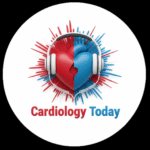Inflammation Predicts CV Events, Statin Benefit 09/30/25

Welcome to Cardiology Today – Recorded September 30, 2025. This episode summarizes 5 key cardiology studies on topics like pulmonary exacerbations and myocarditis. Key takeaway: Inflammation Predicts CV Events, Statin Benefit.
Article Links:
Article 1: Hypertonic Saline or Carbocisteine in Bronchiectasis. (The New England journal of medicine)
Article 2: Artificial Intelligence Automation of Echocardiographic Measurements. (Journal of the American College of Cardiology)
Article 3: Pop-Up Cardiovascular Screening Within Community Pharmacies and an International Sporting Event. (Journal of the American College of Cardiology)
Article 4: Inflammation and Cardiovascular Disease: 2025 ACC Scientific Statement: A Report of the American College of Cardiology. (Journal of the American College of Cardiology)
Article 5: An Aberrant Resurgence of Endogenous Retroviruses Prompts Myocarditis and Heart Failure. (Circulation)
Full episode page: https://podcast.explainheart.com/podcast/inflammation-predicts-cv-events-statin-benefit-09-30-25/
📚 Featured Articles
Article 1: Hypertonic Saline or Carbocisteine in Bronchiectasis.
Journal: The New England journal of medicine
PubMed Link: https://pubmed.ncbi.nlm.nih.gov/41020514
Summary: This two-by-two factorial trial evaluated hypertonic saline versus carbocisteine for bronchiectasis exacerbations, enrolling participants with frequent exacerbations and daily sputum. The study aimed to assess the safety and effectiveness of these mucoactive agents in a large cohort, addressing inconsistencies in current guidelines.
Article 2: Artificial Intelligence Automation of Echocardiographic Measurements.
Journal: Journal of the American College of Cardiology
PubMed Link: https://pubmed.ncbi.nlm.nih.gov/40914895
Summary: This study developed and validated open-sourced deep learning semantic segmentation models to automate comprehensive echocardiographic measurements, aiming to reduce the time and imprecision associated with manual assessment. The goal is to leverage artificial intelligence to decrease clinician burden and improve diagnostic accuracy and longitudinal tracking of cardiovascular disease.
Article 3: Pop-Up Cardiovascular Screening Within Community Pharmacies and an International Sporting Event.
Journal: Journal of the American College of Cardiology
PubMed Link: https://pubmed.ncbi.nlm.nih.gov/40815240
Summary: This prospective observational study investigated an opportunistic pop-up screening approach for atherosclerotic cardiovascular disease risk within community pharmacies and at a sporting event over seven weeks. It aimed to identify differences in the captured populations based on screening location, day, and time to improve population-level screening uptake and compliance.
Article 4: Inflammation and Cardiovascular Disease: 2025 ACC Scientific Statement: A Report of the American College of Cardiology.
Journal: Journal of the American College of Cardiology
PubMed Link: https://pubmed.ncbi.nlm.nih.gov/41020749
Summary: This scientific statement highlights the critical role of inflammation, particularly residual inflammation measured by high-sensitivity C-reactive protein, in the pathogenesis and outcomes of cardiovascular disease. It emphasizes that elevated high-sensitivity C-reactive protein predicts recurrent cardiovascular events even in statin-treated patients and identifies higher-risk individuals in whom statin therapy significantly reduces the risk of first major cardiovascular events.
Article 5: An Aberrant Resurgence of Endogenous Retroviruses Prompts Myocarditis and Heart Failure.
Journal: Circulation
PubMed Link: https://pubmed.ncbi.nlm.nih.gov/40820798
Summary: This research explored the potential role of endogenous retrovirus resurgence in heart failure by establishing a total RNA sequencing pipeline to assess their occurrence in human and murine heart failure models. The study generated myocardium-specific mouse lines to investigate how this aberrant retroviral activity might induce myocarditis and contribute to the development of heart failure.
📝 Transcript
Today’s date is September 30, 2025. Welcome to Cardiology Today. Here are the latest research findings.
Article number one. Hypertonic Saline or Carbocisteine in Bronchiectasis. This two-by-two factorial trial evaluated hypertonic saline versus carbocisteine for bronchiectasis exacerbations, enrolling participants with frequent exacerbations and daily sputum. The study aimed to assess the safety and effectiveness of these mucoactive agents in a large cohort, addressing inconsistencies in current guidelines.
Article number two. Artificial Intelligence Automation of Echocardiographic Measurements. This study developed and validated open-sourced deep learning semantic segmentation models to automate comprehensive echocardiographic measurements, aiming to reduce the time and imprecision associated with manual assessment. The goal is to leverage artificial intelligence to decrease clinician burden and improve diagnostic accuracy and longitudinal tracking of cardiovascular disease.
Article number three. Pop-Up Cardiovascular Screening Within Community Pharmacies and an International Sporting Event. This prospective observational study investigated an opportunistic pop-up screening approach for atherosclerotic cardiovascular disease risk within community pharmacies and at a sporting event over seven weeks. It aimed to identify differences in the captured populations based on screening location, day, and time to improve population-level screening uptake and compliance.
Article number four. Inflammation and Cardiovascular Disease: 2025 ACC Scientific Statement. This scientific statement highlights the critical role of inflammation, particularly residual inflammation measured by high-sensitivity C-reactive protein, in the pathogenesis and outcomes of cardiovascular disease. It emphasizes that elevated high-sensitivity C-reactive protein predicts recurrent cardiovascular events even in statin-treated patients and identifies higher-risk individuals in whom statin therapy significantly reduces the risk of first major cardiovascular events.
Article number five. An Aberrant Resurgence of Endogenous Retroviruses Prompts Myocarditis and Heart Failure. This research explored the potential role of endogenous retrovirus resurgence in heart failure by establishing a total RNA sequencing pipeline to assess their occurrence in human and murine heart failure models. The study generated myocardium-specific mouse lines to investigate how this aberrant retroviral activity might induce myocarditis and contribute to the development of heart failure.
Thank you for listening. Don’t forget to subscribe.
🔍 Keywords
pulmonary exacerbations, myocarditis, mucoactive agents, echocardiography, semantic segmentation, hypertonic saline, carbocisteine, statin therapy, residual inflammation, endogenous retroviruses, myocardium, atherosclerotic cardiovascular disease, artificial intelligence, community pharmacies, opportunistic screening, RNA sequencing, cardiovascular disease, high-sensitivity C-reactive protein, bronchiectasis, cardiovascular risk, heart failure, deep learning, inflammation, pop-up screening.
ℹ️ About
Concise summaries of cardiovascular research for professionals.
Subscribe • Share • Follow